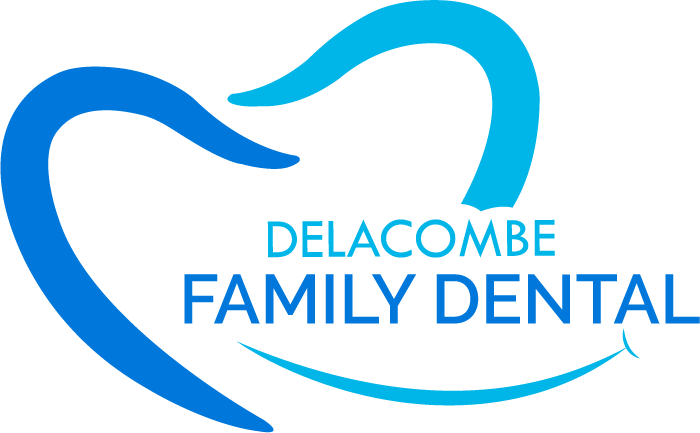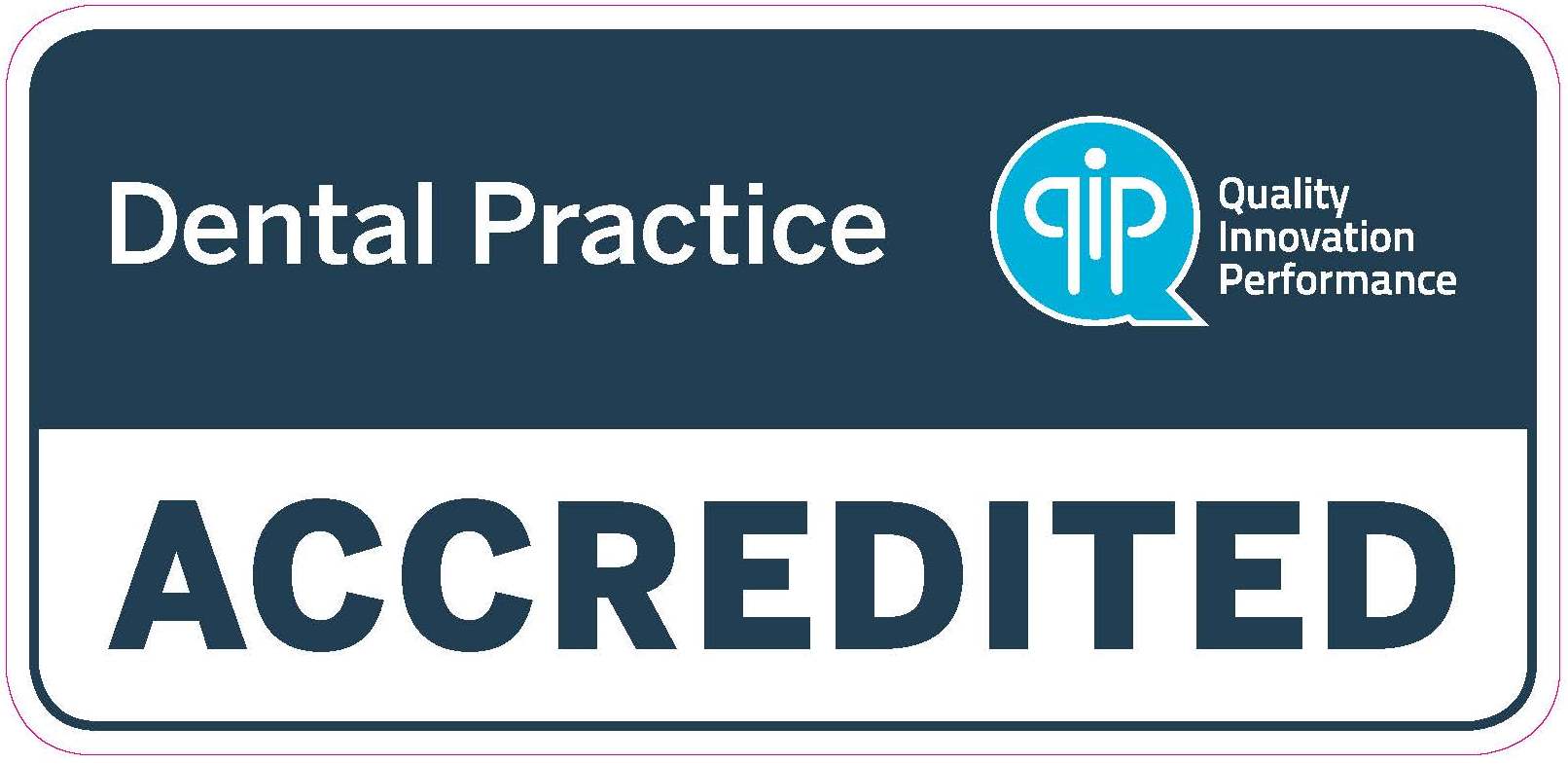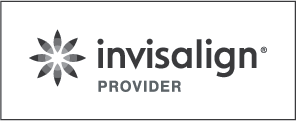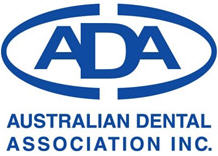When you find yourself frantically searching for an “emergency dentist near me,” it’s usually because you’re in a bad spot. We’re talking about sudden, sharp pain or a dental injury that can’t be ignored. A true dental emergency isn’t just a minor inconvenience; it’s a serious situation like a knocked-out tooth, unbearable pain, facial swelling, or bleeding that won’t stop. The first step, before you even pick up the phone, is to quickly and calmly assess what’s happening.
Is It a Real Dental Emergency?
It’s 2 AM and a throbbing pain in your jaw has jolted you awake. Or maybe an errant ball during a weekend footy match has left you with a chipped tooth. That gut-wrenching question hits you immediately: do I need to see someone right now?
Knowing the difference between a serious problem and something that can wait until morning can save you a lot of stress (and a potential after-hours call-out fee).
Urgent vs. Non-Urgent Dental Problems
Learning to triage your own dental issue is a crucial skill. For instance, a lost filling is annoying, but unless it’s causing agonising pain, it can probably wait until the clinic’s regular business hours.
On the other hand, a completely knocked-out tooth is a different story altogether—it’s a time-sensitive crisis where every single minute counts if you want to save the tooth. Likewise, if your face is starting to swell up, it could signal a dangerous infection, like a dental abscess, which needs to be dealt with straight away.
This infographic breaks down the common signs that tell you it’s time to act fast.
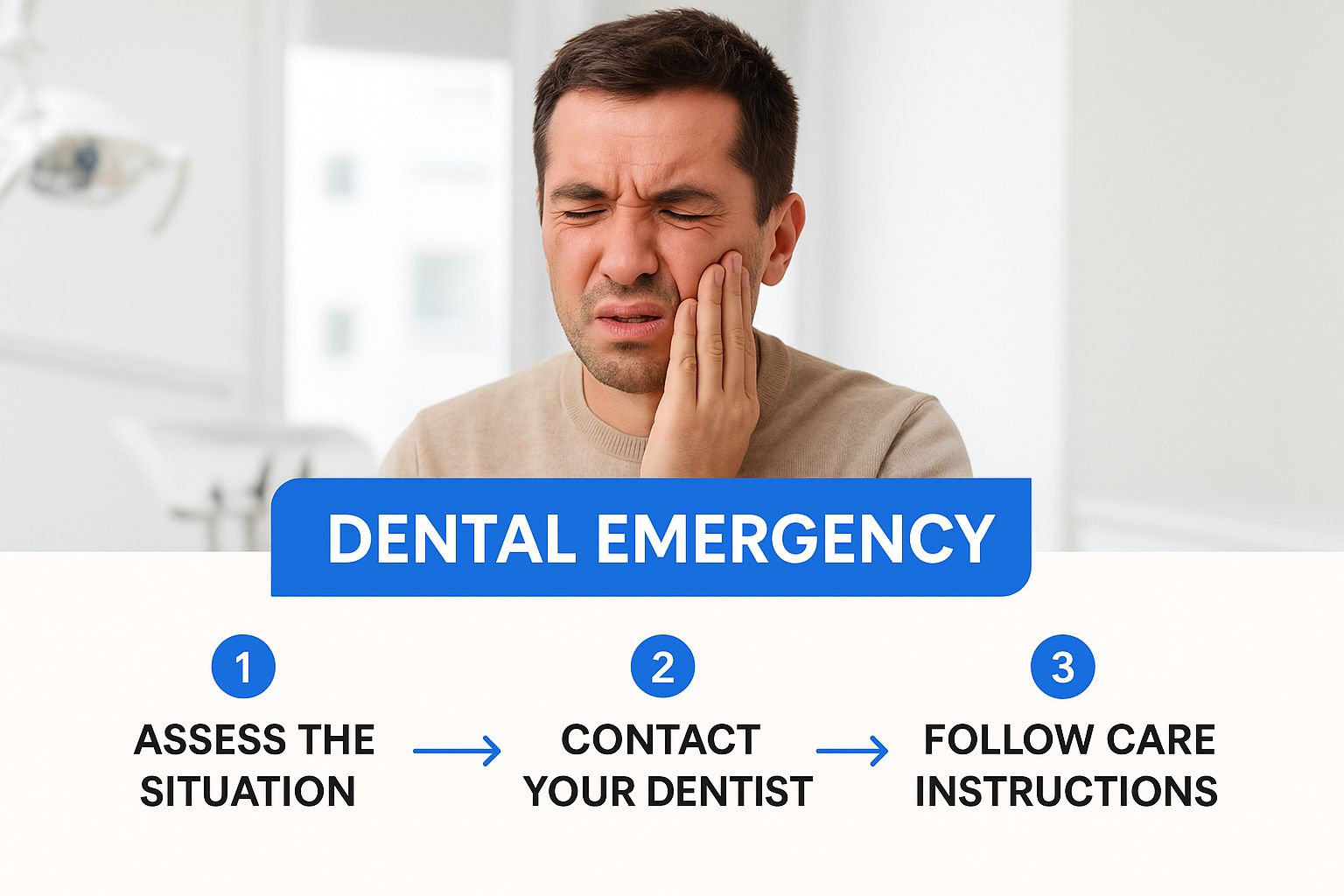
As you can see, intense, persistent pain is a massive red flag. It’s your body’s way of screaming that something is seriously wrong.
Pain is a warning signal. Severe, unrelenting dental pain is never something to ignore. It almost always points to an underlying problem that needs a professional to diagnose and treat it properly.
Here in Victoria, the public health system uses a triage system to prioritise dental emergencies. The most critical cases, like uncontrolled bleeding from an accident, are labelled as Triage Category 1 and require treatment within 24 hours to prevent serious health complications. Understanding where your situation might fall on this scale helps you make a clear-headed decision.
To give you a bit more clarity, here’s a quick guide to help you figure out what to do next.
Your Dental Emergency Cheat Sheet
Use this quick guide to assess your symptoms and see what your immediate next step should be.
| Symptom | Urgency Level | What to Do Now |
|---|---|---|
| Knocked-out permanent tooth | Critical | Call a dentist immediately. Handle the tooth by the crown (not the root) and try to place it back in the socket or store it in milk. |
| Severe, throbbing pain | High | This could be an abscess or infection. Call an emergency dentist for advice. Take over-the-counter pain relief if you can. |
| Facial swelling | High | A swollen cheek or jaw often indicates a serious infection. Seek immediate dental care. |
| Uncontrolled bleeding | High | Apply firm, steady pressure with a clean gauze. If bleeding doesn’t stop after 10-15 minutes, call a dentist or go to an emergency room. |
| Chipped or cracked tooth | Medium | If there’s no severe pain, it can often wait. Rinse your mouth with warm salt water and avoid chewing on that side. Book a regular appointment. |
| Lost filling or crown | Low to Medium | Not usually an emergency unless you’re in significant pain. Keep the area clean and see your dentist within a few days. |
This table should help you stay calm and take the right action. For a more in-depth look at what we offer, you can explore our detailed guide on emergency dentistry services available to the Ballarat community.
What to Do Before You See the Dentist
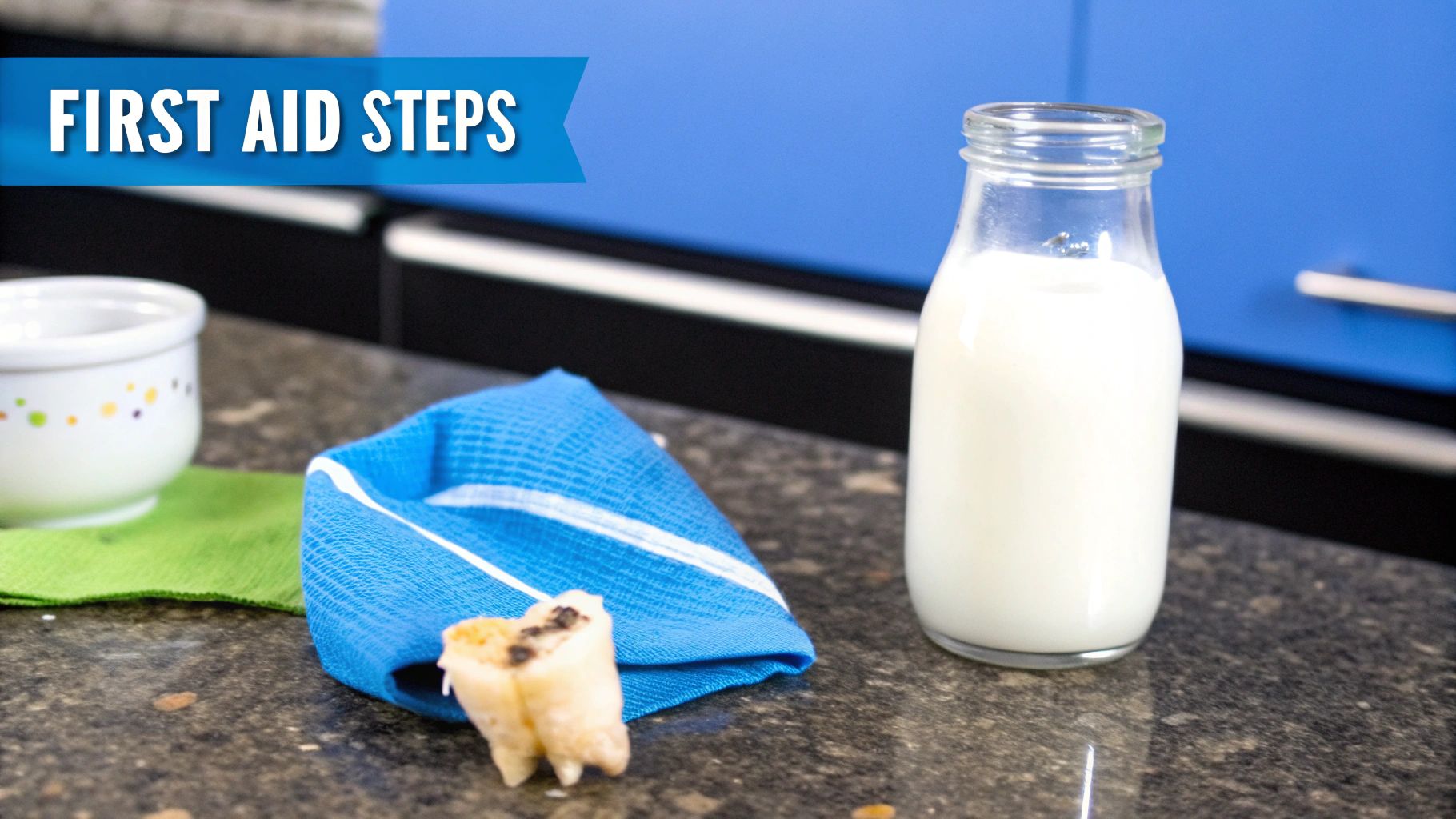
Panic is a natural reaction when you’ve just injured a tooth, but the actions you take in those first few minutes are absolutely crucial. Getting it right can be the difference between saving or losing a tooth, and will certainly make things easier once you get to the dentist’s chair.
Think of this as dental first aid. Different injuries need different immediate responses, and knowing exactly what to do can help manage pain and prevent the problem from getting worse.
Handling a Knocked-Out Tooth
If an adult tooth gets knocked out completely, the clock starts ticking immediately. You have a very small window—often less than an hour—to give that tooth the best chance of being successfully re-implanted.
Here’s what you need to do, fast:
- Handle with care: Pick the tooth up by the crown (the part you chew with). It’s vital you never touch the root, as this can damage the very cells needed for it to reattach to the bone.
- Give it a quick rinse: If it’s dirty, a brief 10-second rinse in milk or even your own saliva is best. Avoid tap water at all costs, and definitely don’t use soap or try to scrub it clean.
- Put it back in place: If you can, gently guide the tooth back into its socket. Hold it there by biting down softly on a clean piece of gauze or a handkerchief.
- Store it safely: Can’t get it back in? The next best thing is to keep it moist. Pop it in a small container of milk or tuck it inside your cheek.
A knocked-out tooth is probably the most time-sensitive dental emergency there is. Following these steps and getting to a dentist straight away dramatically improves the odds of a successful outcome.
Managing Other Common Dental Crises
Of course, not every dental emergency is quite so dramatic. Knowing how to deal with intense pain, swelling, or a broken crown can provide significant relief while you’re waiting for your appointment.
For a throbbing toothache, gently swishing warm salt water around your mouth can help clean the area and reduce inflammation. Over-the-counter pain relief is fine, but a word of warning: never put an aspirin tablet directly against your gum or tooth. It can cause a nasty chemical burn.
If you’ve chipped a tooth or lost a filling or crown, try to gather any fragments you can find and bring them with you. A cold compress held against your cheek will help with any pain and swelling. For a more comprehensive overview, this guide on what to do in a dental emergency is a great resource. Your main job here is to protect the exposed, sensitive part of the tooth until a professional can properly fix it.
How to Find an After Hours Dentist Fast
When a dental emergency hits after hours, that frantic “emergency dentist near me” search can feel overwhelming. Your usual clinic is closed, but the pain just won’t wait. The good news is, you’ve got options to find help quickly, even on a weekend or public holiday.
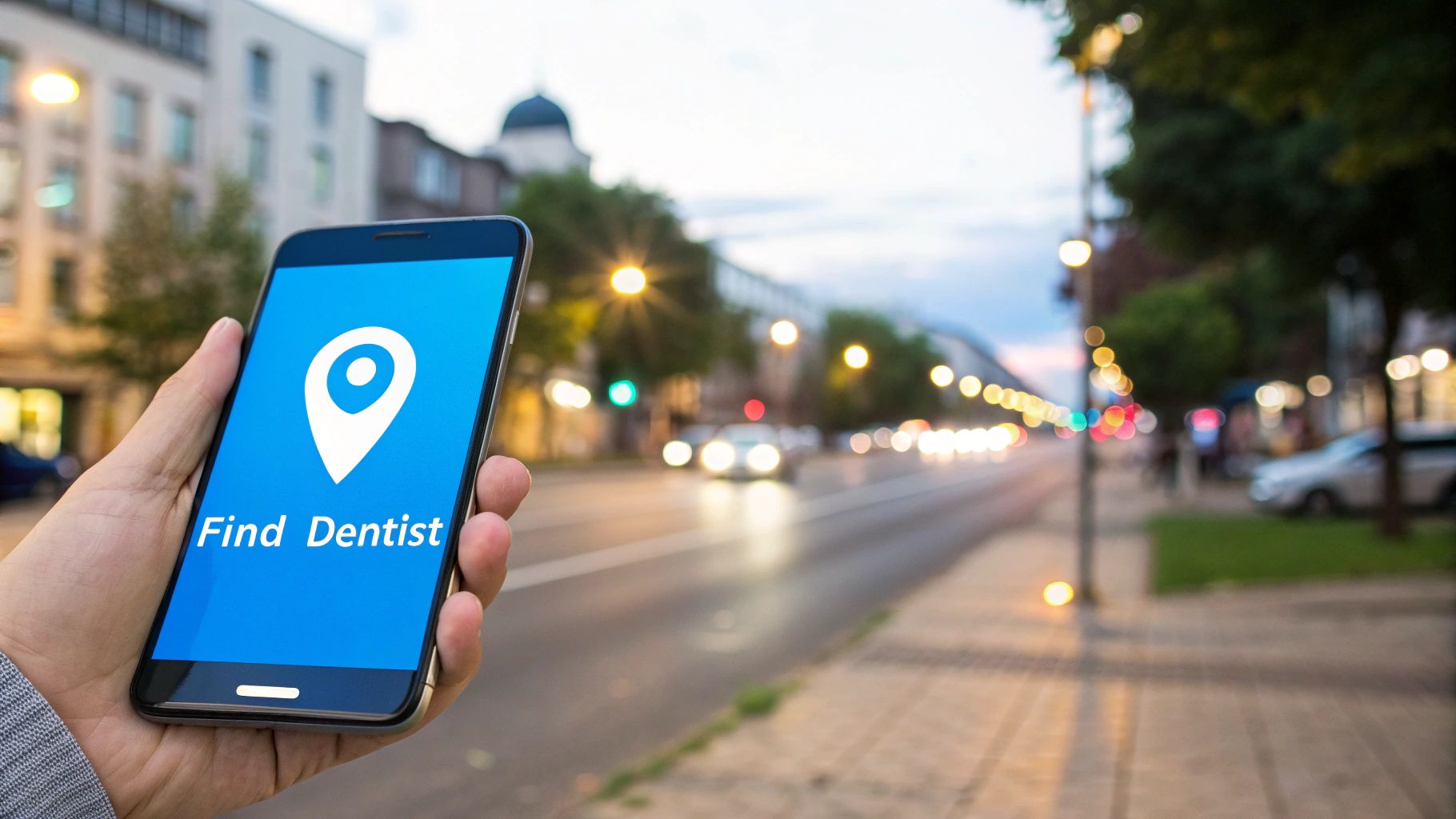
First, get specific with your online search. Instead of just a generic query, try typing “emergency dentist open now” or “after hours dental clinic Ballarat” directly into Google or Google Maps. This usually gives you much more relevant results, showing clinics that are actually open. Many practices also use medical appointment scheduling software that shows you their real-time availability.
Another great trick is to simply call your regular dental practice. I know, they’re closed. But often, their voicemail will have a recorded message with instructions for emergencies, including a number for an on-call dentist or a partner clinic they trust. This is one of the best ways to get reliable care.
Essential Questions to Ask When You Call
Once you get a potential clinic on the line, you need to get some crucial information before you rush out the door. The last thing you want is to waste time travelling to a practice that can’t help you.
Make sure you confirm these key details:
- Can they see you? Start by explaining your situation and ask directly, “Are you able to see a new patient for an emergency right now?”
- What are the costs? Ask about the consultation fee and get a rough idea of the costs for common emergency procedures like a filling or an extraction. A good clinic will be upfront about this.
- How can you pay? Check if they have HICAPS for instant health fund claims or if they offer any payment plans.
A few quick questions upfront can save you a world of stress and unexpected costs later. You’re already in a tough spot; you need a clinic that is clear about their process and fees to help you feel back in control.
Finally, don’t forget trusted resources like Healthdirect Australia, which has a handy service finder for local health providers. And for anyone in our community, you can always check the hours for our Ballarat and Delacombe locations. Having a game plan like this helps you find the right help without delay.
Public vs Private Emergency Dental Options
When you’re in the middle of a dental emergency, the last thing you want is confusion about where to go. The choice between public and private care can feel pretty overwhelming, but it really boils down to balancing two things: how quickly you need help and what you can afford.
In Australia, public dental services are a lifeline for many, but they’re generally reserved for adults with a concession card, like a Health Care Card or Pensioner Concession Card. It’s a fantastic, low-cost option, but there’s often a major catch.
The Reality of Public Wait Times
Let’s be blunt: the public system is stretched thin. Here in Victoria, the system is grappling with huge waiting lists and not enough staff, which has a direct knock-on effect on emergency care.
The average wait for general public dental treatment is an eye-watering 13.1 months. To make matters worse, around 30% of all treatments end up being for emergencies that have spiralled out of control during that long wait. If you want to dive deeper, you can learn more about public dental wait times and see the full picture for yourself.
What this means for you is that while you might get seen for a severe, immediate crisis, any follow-up work or less critical problems could land you on a very long list.
Advantages of Private Dental Care
This is where searching for a private “emergency dentist near me” really pays off, especially when you’re in pain. The biggest plus is speed. You can almost always get a same-day or next-day appointment to get things sorted out straight away.
But the benefits don’t stop there. With private care, you also get:
- Choice of Dentist: You can see your own trusted dentist or pick a practitioner you’re comfortable with.
- Flexible Hours: Many private clinics have after-hours and weekend appointments precisely for these kinds of urgent situations.
- Comprehensive Services: You’ll often find a wider range of treatments and more advanced technology available right then and there.
While you’ll have an out-of-pocket cost with private care, the value of getting immediate relief and stopping a small problem from becoming a massive one is something many people find is well worth it.
Of course, cost is a big factor. If you’re weighing up payment options, our guide explaining if Australian dentists bulk bill can help clarify your options. And don’t forget, your private health insurance can make a significant dent in the final bill.
Right, you’ve found a clinic and locked in an appointment. That’s a huge step. Taking just a few minutes to get organised before you head out the door can make a world of difference, turning a frantic rush into a much smoother experience.
This isn’t just about saving time; it’s about helping the dental team get to the root of the problem faster. When you’re prepared, you can focus on one thing: getting relief.
What to Bring and What to Ask
Walking into that appointment with everything the dentist needs for a quick, accurate diagnosis is your best bet for calming any frayed nerves. A little organisation goes a long way.
Think of it as a go-bag for your dental emergency. Here’s a quick rundown of what you should have in hand:
- Your ID and Health Fund Card: These are non-negotiable for the admin side of things and for processing any on-the-spot claims with HICAPS.
- A List of Your Medications: Jot down everything you’re taking—prescriptions, over-the-counter meds, even vitamins and supplements. It all matters.
- The Damaged Tooth: If a tooth has been knocked out or a piece has chipped off, pop it in a small container of milk and bring it with you.
Being ready with all your info means less time with a clipboard and more time in the dentist’s chair getting the help you need. It puts you back in control during a pretty stressful situation.
It’s also worth remembering that even though national reports might show a surplus of dentists, finding one when you’re in a pinch can still be tricky, especially in certain areas. You can learn more about how workforce distribution affects oral health care in Australia. This reality check just highlights why finding an emergency dentist near me who is actually available is so important.
Your Urgent Dental Care Questions, Answered
When a dental emergency strikes, your mind starts racing. It’s completely normal to have a flood of questions, especially when you’re in pain and feeling stressed. Getting some clear answers can make a world of difference, so let’s walk through some of the most common things Australians ask when they’re frantically searching for an “emergency dentist near me.”
How Much Is an Emergency Dental Visit Going to Cost?
This is usually the number one concern, and honestly, it varies. In Australia, you can expect an initial emergency consultation to be anywhere from $80 to over $200. This really depends on the clinic’s location and their specific fees. That first payment usually just covers the dentist having a good look and figuring out what’s wrong.
Of course, any actual treatment is an extra cost. A straightforward extraction is a world away from the cost of a complex root canal, for instance. Your best bet is to ask for a rough cost estimate over the phone before you even leave the house. It’s also a great time to ask if they have payment plans or accept services like Afterpay.
Should I Just Go to the Hospital for a Bad Toothache?
It’s a tempting thought, especially late at night, but a hospital A&E is almost never the right place for a toothache. The doctors there can definitely help you manage severe pain and might give you antibiotics if there’s an infection, but they can’t actually fix the dental issue itself.
You’ll just end up being told to see a dentist anyway. The only time you should head to the hospital for a dental problem is if you’ve had major facial trauma, bleeding you can’t stop, or swelling so severe it’s making it hard to breathe or swallow.
What if I Can’t Afford an Emergency Dentist Right Now?
It’s a tough spot to be in. If you have a concession card (like a Health Care Card), you might qualify for treatment at a public dental clinic. The only catch is that you could be facing a very long wait, which isn’t ideal when you’re in pain.
Most private clinics get that dental emergencies are an unwelcome financial shock. Don’t feel shy about asking them upfront about payment plans. Many are happy to work with you to break the cost down into smaller, more manageable payments over time.
Can an Emergency Dentist Give Me Antibiotics?
Absolutely. If you’re dealing with a nasty dental abscess or an infection that seems to be spreading, the dentist will take a look and can prescribe a course of antibiotics. This is often the first, most critical step to get the infection under control and give you some relief.
Just remember that antibiotics are only a temporary fix. They fight the infection, but you’ll still need to come back for proper dental work to address the root cause of the problem once and for all.
At Delacombe Family Dental, we make urgent cases our priority because we know you need relief, fast. If you’re around Ballarat and need immediate care, please don’t wait. You can find out more about our emergency dental services and see how we can help.
Article created using Outrank
